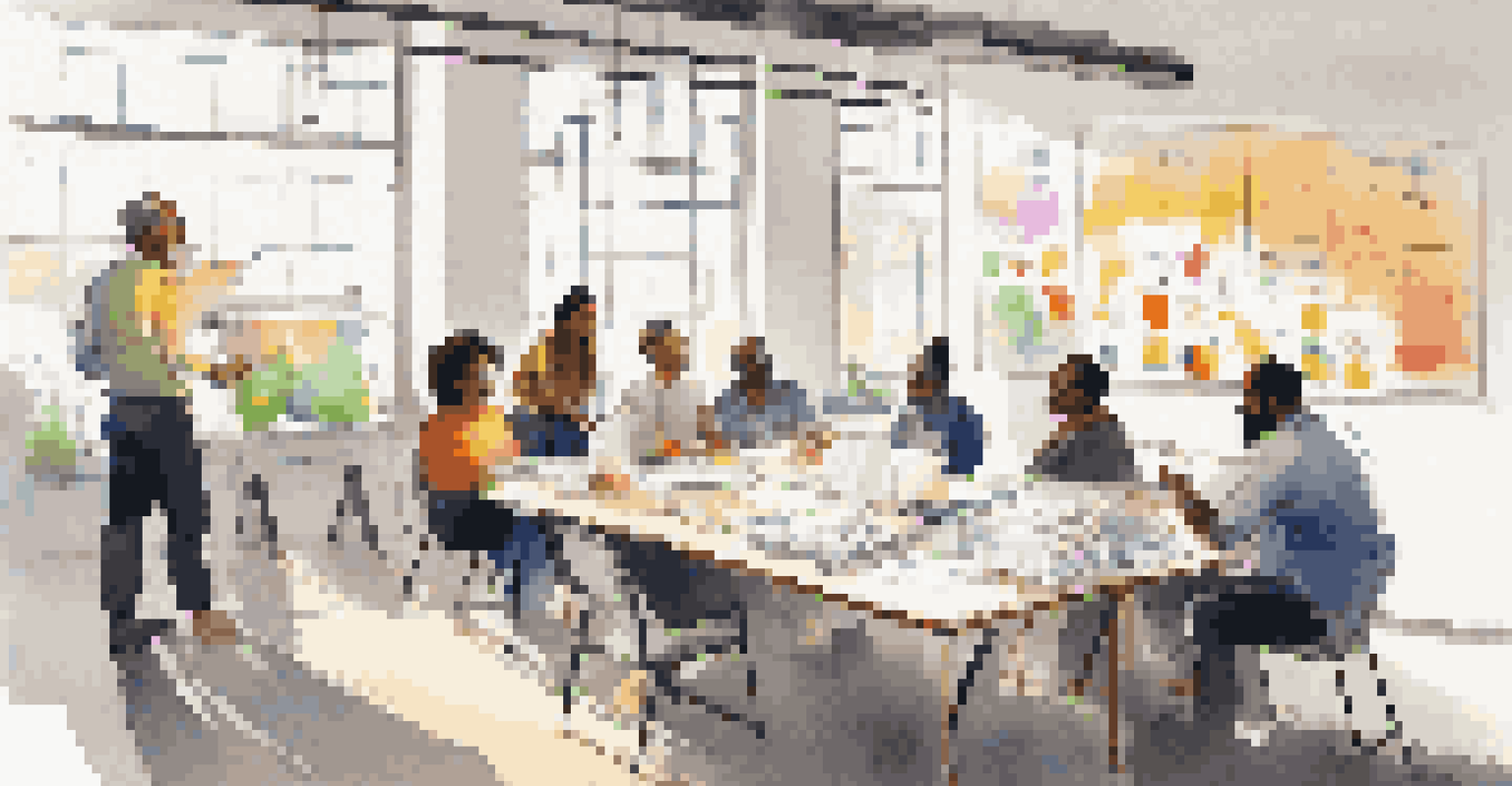How to Foster Critical Thinking in Remote Work Environments

Understanding the Importance of Critical Thinking
Critical thinking is essential in remote work as it empowers employees to analyze situations and make informed decisions. In a virtual environment, where communication can lack nuance, fostering this skill becomes even more crucial. When team members think critically, they can address challenges more effectively and collaborate with greater insight.
Critical thinking is the key to innovation, and innovation is the key to success.
By encouraging critical thinking, organizations not only enhance problem-solving abilities but also promote innovation. Employees who can evaluate information critically are more likely to propose creative solutions, benefiting the entire team. This ability to think outside the box is particularly valuable in remote settings where traditional brainstorming sessions may be limited.
Ultimately, critical thinking helps build a culture of accountability and trust, as team members feel empowered to voice their opinions and ideas. This culture leads to better decision-making processes and, consequently, improved outcomes for projects and tasks.
Creating a Safe Space for Open Dialogue
In remote work settings, establishing a safe space for dialogue is key to fostering critical thinking. Team members need to feel comfortable sharing their thoughts without fear of judgment or reprisal. By promoting a culture of openness, organizations encourage employees to express their ideas and challenge existing processes.

Regular check-ins and virtual meetings can help facilitate these discussions, allowing for a structured environment where everyone can contribute. Using tools like breakout rooms during video calls can also encourage smaller group discussions, which may lead to more in-depth conversations. This way, employees can explore different perspectives and enhance their critical thinking skills together.
Foster Critical Thinking for Success
Encouraging critical thinking in remote teams enhances problem-solving abilities and innovation.
Moreover, acknowledging and celebrating diverse viewpoints can further enhance this atmosphere. When team members see their contributions valued, they are more likely to engage actively in discussions, leading to richer insights and innovative solutions.
Encouraging Questions and Curiosity
One of the best ways to foster critical thinking is to encourage team members to ask questions. A curious mindset leads to deeper exploration of ideas and enhances understanding. By promoting an environment where questioning is welcomed, organizations can stimulate constructive dialogue and innovative thinking.
The mind is not a vessel to be filled, but a fire to be kindled.
Leaders can model this behavior by asking open-ended questions during meetings. For example, instead of asking, 'Is this plan feasible?' try 'What challenges do you foresee with this plan?' This approach invites deeper discussion and allows team members to think critically about potential obstacles and solutions.
Additionally, creating a resource hub where employees can access articles, videos, and case studies can spark curiosity. Encouraging them to share what they learn can also promote a culture of continuous improvement and critical thinking.
Utilizing Collaborative Tools Effectively
In a remote work environment, leveraging collaborative tools is essential for fostering critical thinking. Platforms like Slack, Trello, or Miro can facilitate brainstorming sessions and discussions, allowing team members to share ideas and feedback in real time. Utilizing these tools effectively can enhance communication and collaboration.
For instance, creating shared documents for collaborative projects allows everyone to contribute their thoughts and suggestions. This not only promotes critical thinking but also ensures that all voices are heard and valued. Visual tools, such as mind maps or flowcharts, can also help in organizing thoughts and exploring complex ideas.
Create Open Dialogue Environments
Establishing a safe space for dialogue allows team members to share ideas without fear, promoting collaboration.
Moreover, assigning roles within these tools can help clarify responsibilities and encourage ownership of ideas. When team members take ownership of their contributions, they are more likely to engage critically and thoughtfully with their tasks.
Implementing Regular Training and Workshops
Training and workshops focused on critical thinking can significantly enhance these skills among remote teams. By providing structured learning opportunities, organizations can equip their employees with the tools they need to think critically. These sessions can cover topics like logical reasoning, problem-solving techniques, and decision-making frameworks.
Interactive workshops that involve real-world scenarios can be particularly effective. Team members can work through case studies or simulations that require critical thinking and collaboration, helping them apply learned concepts to practical situations. This hands-on approach not only reinforces skills but also builds camaraderie among remote workers.
Additionally, inviting guest speakers or industry experts can provide fresh perspectives and inspire employees to think differently. This exposure to new ideas can ignite curiosity and motivate team members to engage more critically in their work.
Promoting Reflection and Self-Assessment
Encouraging employees to reflect on their work and thought processes is a powerful way to foster critical thinking. Reflection allows individuals to evaluate their decisions and identify areas for improvement. By integrating regular self-assessment practices, teams can enhance their ability to think critically about their work.
Tools like journaling or feedback sessions can facilitate this process. For instance, after completing a project, team members can write down what worked well and what challenges they faced. This practice not only promotes critical thinking but also aids in personal growth and development.
Promote Reflection and Growth Mindset
Encouraging self-assessment and a growth mindset helps employees learn from experiences and enhances critical thinking.
Moreover, sharing these reflections with the team can create a culture of learning. When employees see their colleagues engaging in self-assessment, it encourages them to do the same, leading to a collective enhancement of critical thinking skills across the organization.
Cultivating a Growth Mindset Among Teams
Fostering a growth mindset is essential for promoting critical thinking in remote work environments. A growth mindset encourages employees to view challenges as opportunities for learning rather than obstacles. When team members embrace this perspective, they are more likely to engage in critical thinking and problem-solving.
Leaders can cultivate this mindset by celebrating effort and resilience, rather than just outcomes. For example, acknowledging team members who take risks in their work—even if the results aren't perfect—reinforces the idea that learning and growth are valuable. This approach creates a supportive environment where employees feel empowered to think critically.

Additionally, providing opportunities for skill development can boost confidence and encourage a growth mindset. When employees feel they have the tools to succeed, they are more likely to apply critical thinking in their roles, ultimately benefiting the entire organization.